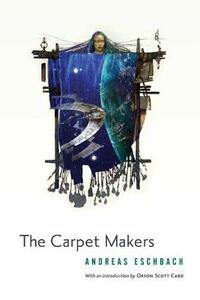You need to sign in or sign up before continuing.
Take a photo of a barcode or cover
Other reviews have compared the structure of this novel to a carpet - many different stories, different lives,knotted together into a overall pattern that reveals the central mystery. I think that's a good insight. Like carpet threads, many of the stories are cut short, leaving me wondering what happened to the characters in it.
It's an interesting book that borders on horror, and it makes me think of one fanatical religion in particular (the parallels cannot be coincidental, imo).
It's an interesting book that borders on horror, and it makes me think of one fanatical religion in particular (the parallels cannot be coincidental, imo).
mysterious
medium-paced
Plot or Character Driven:
Plot
Strong character development:
No
Loveable characters:
Complicated
Diverse cast of characters:
No
Flaws of characters a main focus:
Yes
dark
mysterious
slow-paced
Loveable characters:
No
Diverse cast of characters:
No
Orson Scott Card tells us how he attended a science-fiction convention in France where all everyone would talk about was the new German author Andreas Eschbach. Unfortunately, his books weren't available in English, so Card returned home with a short story, actually the first chapter of The Carpet Makers, and asked a friend to translate it for him: “The result was a story that blew [him] away”. Later, Orson Scott Card managed to introduce the book to Tor publishing and got his friend Doryl Jensen to translate the rest of it.
The Carpet Makers is truly unique. The story is brilliant, but what shines even more is its insights on politics, cult of personality and the impact of revolution on culture. Yet, what really stroke me as pure genius in this novel is its very particular structure. I can honestly say I've never read anything like this before and it really makes The Carpet Makers a masterpiece of literature.
The Carpet Makers' story doesn't progress in a traditional way: the narration keeps changing point of view and the reader feels like a little wisp feeding on people's thoughts and feelings, changing target as he learns everything he can. The focus of this exploration is a pan-galactic Empire, its customs and culture, and a great mystery about the production of human-hair carpets, a life-long and painstaking task undertaken by its subjects.
Each chapter is based on a new character and how he relates to the Empire: his (imposed or not) role in society and his faith (or lack of) in the Emperor. One of my favourite story is about a boy who was enlisted as an Empire shipman. What he wants, though, is to become a musician so he takes refuge in his music teacher's home. However, his defection exposes both men to the risk of the death penalty.
The Carpet Makers really is a book about people and their relation to power, politics, religion and everyday needs, as they all conflict with each other. As a result, almost every single chapter works perfectly as a short story. This is really remarkable and gives a lot of depth to the book, as you explore every part of this huge organism that is the Empire.
Thus, the progression of the book is not chronological or led by a single main character. It's more thematic: each chapter is an exploration of new elements revealed in the previous one. It follows a trail from character to character and place to place, starting from an incident on a nondescript planet to finally shed light on a universe-wide tragedy. Absolutely riveting and epic.
I also love The Carpet Makers insights on social issues. It first shows the danger of mingling politics and religion, and especially of the cult of personality. Extreme fear and faith blind people's best judgement and lock them into a dark age of obscurantism, in which their belief justifies hurting each other. Even better, Andreas Eschbach also explores the other side of the coin: the damage of violent, hatred-driven revolution. He especially shows how the misplaced zeal of rebels, eager to reject everything from the previous government, can lead to a dramatic loss of knowledge, history and stability.
To conclude, I can't recommend The Carpet Makers enough. It's a thought-provoking, epic science-fiction novel about a several-thousand-years-old universe-wide Empire through its people. The structure of the book is remarkable, very unique and makes the book “unputdownable”, a word I had sworn I would never use (sorry!). Since I said it, let me add that it is an absolute must-read!
The Carpet Makers is truly unique. The story is brilliant, but what shines even more is its insights on politics, cult of personality and the impact of revolution on culture. Yet, what really stroke me as pure genius in this novel is its very particular structure. I can honestly say I've never read anything like this before and it really makes The Carpet Makers a masterpiece of literature.
The Carpet Makers' story doesn't progress in a traditional way: the narration keeps changing point of view and the reader feels like a little wisp feeding on people's thoughts and feelings, changing target as he learns everything he can. The focus of this exploration is a pan-galactic Empire, its customs and culture, and a great mystery about the production of human-hair carpets, a life-long and painstaking task undertaken by its subjects.
Each chapter is based on a new character and how he relates to the Empire: his (imposed or not) role in society and his faith (or lack of) in the Emperor. One of my favourite story is about a boy who was enlisted as an Empire shipman. What he wants, though, is to become a musician so he takes refuge in his music teacher's home. However, his defection exposes both men to the risk of the death penalty.
The Carpet Makers really is a book about people and their relation to power, politics, religion and everyday needs, as they all conflict with each other. As a result, almost every single chapter works perfectly as a short story. This is really remarkable and gives a lot of depth to the book, as you explore every part of this huge organism that is the Empire.
Thus, the progression of the book is not chronological or led by a single main character. It's more thematic: each chapter is an exploration of new elements revealed in the previous one. It follows a trail from character to character and place to place, starting from an incident on a nondescript planet to finally shed light on a universe-wide tragedy. Absolutely riveting and epic.
I also love The Carpet Makers insights on social issues. It first shows the danger of mingling politics and religion, and especially of the cult of personality. Extreme fear and faith blind people's best judgement and lock them into a dark age of obscurantism, in which their belief justifies hurting each other. Even better, Andreas Eschbach also explores the other side of the coin: the damage of violent, hatred-driven revolution. He especially shows how the misplaced zeal of rebels, eager to reject everything from the previous government, can lead to a dramatic loss of knowledge, history and stability.
To conclude, I can't recommend The Carpet Makers enough. It's a thought-provoking, epic science-fiction novel about a several-thousand-years-old universe-wide Empire through its people. The structure of the book is remarkable, very unique and makes the book “unputdownable”, a word I had sworn I would never use (sorry!). Since I said it, let me add that it is an absolute must-read!
dark
mysterious
reflective
fast-paced
Plot or Character Driven:
Plot
Strong character development:
No
Loveable characters:
No
Diverse cast of characters:
Yes
Flaws of characters a main focus:
No
dark
reflective
sad
medium-paced
Plot or Character Driven:
A mix
Strong character development:
No
Loveable characters:
No
Diverse cast of characters:
Yes
Flaws of characters a main focus:
No
4-
This was very unusual, and has stuck in my mind since completing it months ago now. If there is a take-home message to the novel, it's something along the lines of: "Humans are powerful, highly suggestible, malleable machines, capable of just about anything, sublime or terrible, for just about any motive, beneficent or evil...and most of us probably don't have any idea which category we and our actions fit in to." I found the story really quite captivating.
This is not the most technically-minded sci-fi but rather a great execution of a strange and vast future, peopled with varied, interesting and genuine characters. The narrative is interestingly structured into distinct but interlinked little episodes, and the exposition of the Empire and its history is well paced, yielding little at first but teasing and suggesting at an accelerating pace. The mystery of the hair carpets themselves was strange and intricate, fully captured my attention, and was satisfyingly
This was very unusual, and has stuck in my mind since completing it months ago now. If there is a take-home message to the novel, it's something along the lines of: "Humans are powerful, highly suggestible, malleable machines, capable of just about anything, sublime or terrible, for just about any motive, beneficent or evil...and most of us probably don't have any idea which category we and our actions fit in to." I found the story really quite captivating.
This is not the most technically-minded sci-fi but rather a great execution of a strange and vast future, peopled with varied, interesting and genuine characters. The narrative is interestingly structured into distinct but interlinked little episodes, and the exposition of the Empire and its history is well paced, yielding little at first but teasing and suggesting at an accelerating pace. The mystery of the hair carpets themselves was strange and intricate, fully captured my attention, and was satisfyingly
Spoiler
if horrifyingly!<\spoiler>, resolved in the end. An engaging, thought-provoking read all in all.
I really, really liked this. Fantastically well-executed and marvelously inventive. Only two (minor) things prevented me from giving it five stars.
Each chapter read like a short story, giving rise to a faintly disjointed feel. Also, as I noted in my progress updates, many of the chapters concluded in death or misfortune, so that while I could admire the artistry of their construction and self-contained elegance, I didn't actually like them.
Still, though, the overall effect was very good indeed.
Edit: definite echoes of Asimov in this.
Each chapter read like a short story, giving rise to a faintly disjointed feel. Also, as I noted in my progress updates, many of the chapters concluded in death or misfortune, so that while I could admire the artistry of their construction and self-contained elegance, I didn't actually like them.
Still, though, the overall effect was very good indeed.
Edit: definite echoes of Asimov in this.
Almost a set of short stories contained in the same universe - the thread of 'why are the carpet makers doing what they're doing' ties them together. The novel looks at futility, about traditions and how humanity assumes so much about each other.
It's rather unique, has an interesting take on world building, I just wish I'd felt a little more connected to the characters in it.
It's rather unique, has an interesting take on world building, I just wish I'd felt a little more connected to the characters in it.
Strange book. Interesting though, I can see why it's so well recieved. My only real problem with it was that the narrative was a tad disjointed, it jumped from perspective to perspective, and from location to location so much that you don't really get invested in any characters or locations. That very well might have been the point, though.




